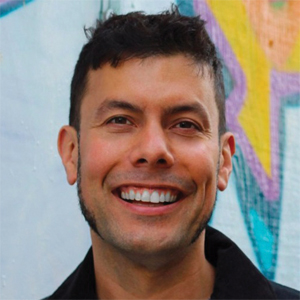Becoming an active citizen and scientist
One thing becomes apparent quickly when talking to , an assistant professor of medicine, biochemistry and pharmacology at Vanderbilt University and Journal of Lipid Research junior associate editor: He doesn’t isolate himself in an ivory tower.
Since he was a grad student at New York University, Blind has reached out to students of all ages and abilities who need a mentor or a teacher, especially those who otherwise might be unable to forge their way into science. He tutored learning-disabled undergraduates, mentored high schoolers and taught evening classes at Berkeley. During his postdoc at the University of California, San Francisco, he worked as a National Institutes of Health institutional research and academic career development, or , fellow, teaching at a local college and sharing his insights about higher education. He also took time out of his postdoc work to teach at an understaffed medical school in Tanzania.
The Journal of Lipid Research junior associate editors will present their work at the 2021 annual meeting, 2:15–3:30 p.m., Thursday, April 29.
Find out about registering for the annual meeting here.
“The students who didn’t go to private schools, the ones who had to work through college and maybe didn’t have all the privileges other students had, I wanted to do whatever I could to help people like that,” he said.
Blind sees himself in those students; his mother emigrated from Paraguay as a teenager after working outside her home since age 9, and his father built machine parts for General Motors. Both were curious, adventurous problem solvers, important traits for the parents of a future scientist, but they were not part of the elite academic world, so Blind had to make his own way.
He initially thought he’d pursue a teaching career at a smaller liberal arts college but soon realized he wanted to do more research, and he has flourished since starting his lab. He hasn’t forgotten his mission of service, though; he is working to establish an IRACDA teaching postdoc program at Vanderbilt.
Blind’s mentor at the JLR, George Carman, describes him as an “outstanding young scientist” as well as a “good citizen to the lipid community.” Judging from Blind’s career of service, he appears to be a good citizen of the wider science community as well.
The many facets of nonmembrane lipids
 Ray BlindRay Blind’s lab studies aspects of what nonmembrane phosphoinositide lipids can do in the cell and how they do those things. In particular, the lab is interested in these lipids acting as signaling molecules in the nucleus.
Ray BlindRay Blind’s lab studies aspects of what nonmembrane phosphoinositide lipids can do in the cell and how they do those things. In particular, the lab is interested in these lipids acting as signaling molecules in the nucleus.
One main arm (among many) of this work takes structural biology approaches, elucidating the structures of lipid-binding nuclear receptors as well as the nuclear lipid signaling enzyme inositol polyphosphate multikinase, or IPMK. This work suggested potential roles for the disordered domains in IPMK that previously had been somewhat mysterious to scientists.
Another branch of the lab’s work is looking at the potential role lipid signaling enzymes like IPMK and PTEN have in chromatin remodeling and gene expression. They investigate genomewide binding of these molecules to understand how these proteins, traditionally thought to act only on membrane-bound lipids, may be regulating chromatin and transcription directly.
Enjoy reading 91—«…´¥´√Ω Today?
Become a member to receive the print edition four times a year and the digital edition monthly.
Learn moreGet the latest from 91—«…´¥´√Ω Today
Enter your email address, and we’ll send you a weekly email with recent articles, interviews and more.
Latest in People
People highlights or most popular articles

Hidden strengths of an autistic scientist
Navigating the world of scientific research as an autistic scientist comes with unique challenges —microaggressions, communication hurdles and the constant pressure to conform to social norms, postbaccalaureate student Taylor Stolberg writes.

Richard Silverman to speak at 91—«…´¥´√Ω 2025
Richard Silverman and Melissa Moore are the featured speakers at the 91—«…´¥´√Ω annual meeting to be held April 12-15 in Chicago.

Women’s History Month: Educating and inspiring generations
Through early classroom experiences, undergraduate education and advanced research training, women leaders are shaping a more inclusive and supportive scientific community.

91—«…´¥´√Ω honors Lawrence Tabak with public service award
He will deliver prerecorded remarks at the 2025 91—«…´¥´√Ω Annual Meeting in Chicago.

91—«…´¥´√Ω names 2025 JBC/Tabor Award winners
The six awardees are first authors of outstanding papers published in 2024 in the Journal of Biological Chemistry.

Daniel N. Hebert (1962–2024)
Daniel Hebert’s colleagues remember the passionate glycobiologistscientist, caring mentor and kind friend.

